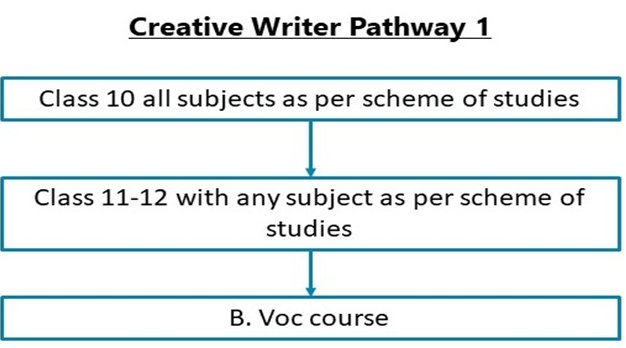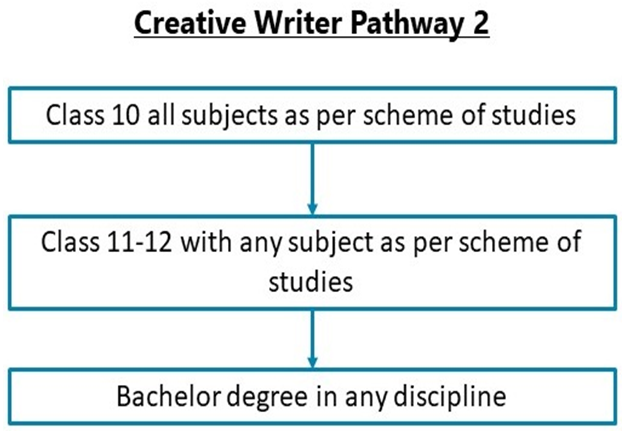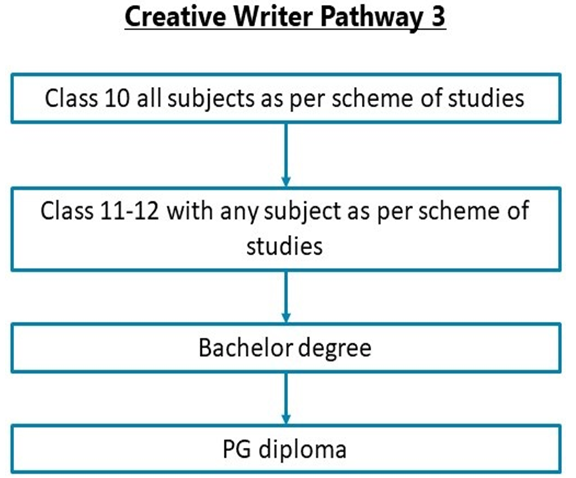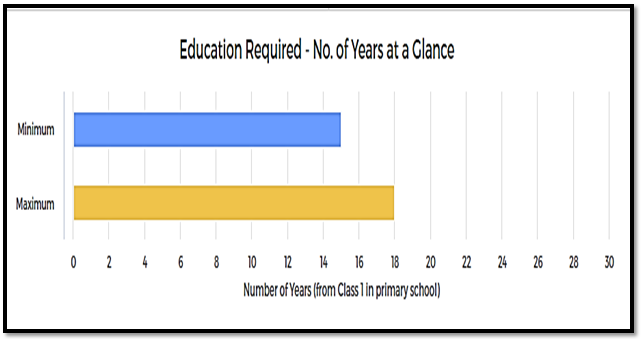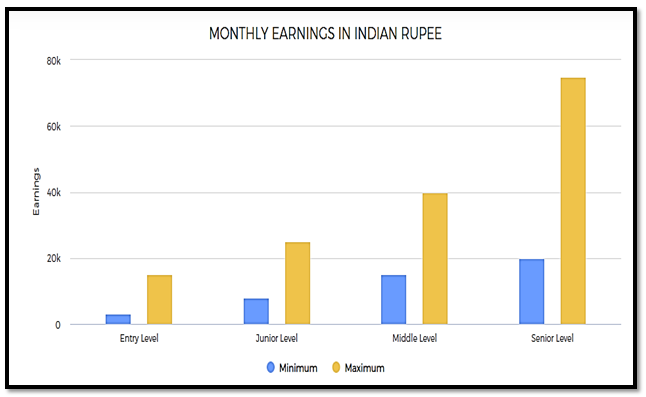Creative Writer
Entry Level Qualification
12
Career Fields
Mass Media, Journalism & Entertainment
For Specially Abled







Career Entrance Exam
About Career
1. Creative Writers are exemplary masters of the written word in English or other regional languages. As a Creative Writer, you should possess decent language skills primarily in any vernacular language or English. Creative Writers can be independent writers if they do not opt for any industrial roles. Creativity and analytical skills are essential when seeking a career in creative writing. Independent authors usually have brilliant research and analytical skills with an outstandingly inquisitive mind.
2. If you opt for an industrial role, you may have to coordinate your work as a technical writer, content writer, editor, blog writer, author, copywriter, press officer, journalist, brand consultant, teacher, scriptwriter, speech-writer, songwriter etc. with your colleagues like art directors, designers, PR personnel, marketing personnel and other professionals including your own creative writing team to produce written materials on a chosen subject matter. As a Creative Writer, you may be writing advertising promotional materials too for billboards, emails or product packaging.
3. Today since English has emerged as the most powerful communication tool on this planet, English Creative Writers can find work in almost any industry. All major businesses in the market (including the Education sector) today convey company related information in English which may be through any mass medium like print or electronic or the Internet.
4. As most companies today are expanding their outreach through digital or Internet media, you may need to know how to increase online search traffic (increase the chance of people discovering your writing first while searching online on a particular topic). This strategy is more commonly known as SEO (Search Engine Optimization) today. You may need to attend SEO courses in order to know more about this.
5. Creative Writers come from almost any discipline, background, exposure level, past experiences, and income groups. The best part is that your educational qualification may be of senior secondary level or Doctoral level, you can always become a Creative Writer. Structured education and formal certification are not pre-requisites for becoming a Creative Writer.
Key Roles and Responsibilities:
As a Creative Writer, you will be engaged with one or more of the following roles and responsibilities depending on the industrial functional area you are involved in:
1. You will be conducting research to obtain authentic detail and factual information using various physical and digital sources for creating textual material or research theses.
2. You will be consulting with colleagues, supervisors or stakeholders for obtaining information on subject matter which is to be worked upon and deciding the designs, structure or style formats.
3. You will be varying the language and tone of written material based on the requirements and established principles.
4. You will be collaborating with other writers for specific projects.
5. You will be meeting with professors, clients, directors, investors, colleagues, technicians or artists etc. to discuss new work projects / these or required modifications to existing written material.
6. You will be revising, editing or rewriting composed material to match personal standards and for meeting the suggestions of your professors, clients, directors, investors, colleagues, technicians or artists pursuant to prior discussions that you may have had.
PARTICULARS | DESCRIPTION |
Name | Creative Writer |
Purpose | Craft Stories, Poems & Essays |
Career Field | Mass Media, Journalism & Entertainment |
Required Entrance Exam | No Entrance Exam |
Average Salary | 150000 - 300000 Rs. Per Year |
Companies For You | Content Writer, Copywriter, Editor & Many More |
Who is Eligible | Class 12th Pass |
Career Entry Pathway
Class 10 all subjects as per scheme of studies - Class 11-12 with any subject as per scheme of studies - B. Voc course
After completing Class 10 all subjects as per scheme of studies then Class 11-12 with any subject as per scheme of studies, you can enroll for a B. Voc (Bachelor of Vocation) course in ‘Mass Communication’, ‘Journalism and Media’ or related disciplines.
Class 10 all subjects as per scheme of studies - Class 11-12 with any subject as per scheme of studies – Bachelor degree in any discipline
After completing Class 10 all subjects as per scheme of studies then Class 11-12 with any subject as per scheme of studies, you can complete your graduation in any discipline, any vernacular language or ‘Linguistics’, ‘English’, ‘Mass Communication’, ‘Journalism and Media’, fine arts or similar.
Class 10 all subjects as per scheme of studies - Class 11-12 with any subject as per scheme of studies - Bachelor degree – PG diploma
After completing Class 10 all subjects as per scheme of studies then Class 11-12 with any subject as per scheme of studies, you can complete your graduation in any discipline, any vernacular language or ‘Linguistics’, ‘English’, ‘Mass Communication’, ‘Journalism and Media’, fine arts or similar. Then you can go for a Post Graduate Diploma / Certificate / Foundation course in ‘Creative Writing’, ‘Copy, Creative & Content’ or similar disciplines.
Class 10 all subjects as per scheme of studies - Class 11-12 with any subject as per scheme of studies – Bachelor degree – Master degree in respective field – Advanced Diploma / Certificate / Foundation course
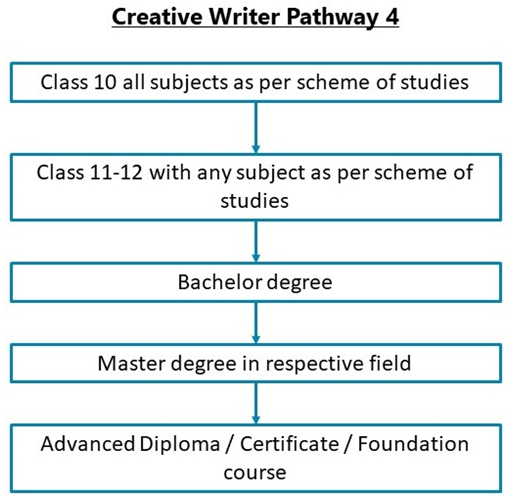
After completing Class 10 all subjects as per scheme of studies then Class 11-12 with any subject as per scheme of studies, you can complete your graduation in any discipline, any vernacular language or ‘Linguistics’, ‘English’, ‘Mass Communication’, ‘Journalism and Media’, fine arts or similar. Then you can complete a Master degree program in your respective field followed by an Advanced Diploma / Certificate / Foundation course in ‘Creative Writing’, ‘Copy, Creative & Content’ or similar disciplines.
Required Qualification & Competencies
There is no course that will prepare you specifically for this discipline as an industry-ready professional. As formal education is not necessary, Creative Writers usually gather knowledge and skills from past experience. There are no set training standards in this field.
After Class 11-12, you can go for:
1. Diploma / Certificate / Foundation courses.
2 .B. Voc / Bachelor degree courses.
After your graduation, you can go for a Post Graduate Diploma or Master level program in your respective field followed by an Advanced Diploma / Certificate / Foundation course in related disciplines.
Various private/public educational establishments offer these or related courses:
1 . Creative Writing for Art
2. Creative Writing for Media
3 .Content Writing & Management
4. Creative Writing
5. Other Media & Communication Studies
MINIMUM EDUCATION REQUIRED | MAXIMUM EDUCATION REQUIRED |
Under Graduate Undergraduate Degree / Honours Diploma / Graduate Diploma (equivalent to a Degree) Programs for which the minimum eligibility is a pass in Higher Secondary / Class XII School Leaving examination. | Post Graduate Postgraduate Degree / Diploma / Certificate Programs for which the minimum eligibility is a pass in Graduation / equivalent Diploma program like Honours Diploma or Graduate Diploma. |
Competencies Required
1. You should have interests for Artistic Occupations. Artistic occupations mostly involve working with creative ideas, art, and designs. These occupations involve abstract or conceptual thinking, creative self-expression and often do not follow any set processes or rules for getting things done.
2 .You should have interests for Investigative Occupations. Investigative occupations involve working with ideas and quite a lot of thinking, often abstract or conceptual thinking. These involve learning about facts and figures; involve the use of data analysis, assessment of situations, decision making and problem-solving.
3. You should have interests for Enterprising Occupations. Enterprising occupations involve taking initiatives, initiating actions, and planning to achieve goals, often business goals. These involve gathering resources and leading people to get things done. These require decision making, risk taking and action orientation.
4. You should have Writing Skills - communicating effectively in writing as appropriate for the needs of the readers.
5. You should have Critical Thinking Skills- Skills in the analysis of complex situations, using logic and reasoning to understand the situations and take appropriate actions or make interpretations and inferences.
6. You should have knowledge of Communications and Media - Knowledge of how different media such as print, television, radio, and social media works; how to produce content such as news, articles, audio-visual programs, etc. for different media. This includes various ways to inform and entertain people via print, audio, audio-visual and online media.
7. You should have Active Listening Skills - Giving full attention to what other people are saying, understanding the points being made by others, asking questions, etc.
8. You should have Reading Comprehension Skills - Skills in understanding written sentences and paragraphs in work related documents.
9. You should have Active Learning Skills - Focused and continuous learning from various sources of information, observation and otherwise for application in getting work done.
10 .You should have Originality - The ability to come up with unusual or innovative ideas about a given topic or situation, or to develop creative ways to solve a problem.
11. You should have Fluency of Ideas - The ability to come up with a number of ideas about a topic (the number of ideas is important, not their quality, correctness, or creativity).
12. You should have Written Expression Ability - communicate information and ideas in writing so others will understand.
13. You should have Oral Comprehension Ability - listen to and understand information and ideas presented through spoken words and sentences.
14. You should have Selective Attention Ability - concentrate on a task over a long period of time without being distracted.
15. You should have Oral Expression Ability - communicate information and ideas in speaking so others will understand.
16. You are always imaginative or in most situations.
17. You act independently sometimes but do not do so in some other times.
18. You prefer to experience new things and have new experiences sometimes.
19. You are mostly impulsive in your action and behavior.
Career - Job Opportunities & Profiles
You will get many work roles with publishing agencies, advertising agencies, marketing agencies, software companies, media houses, film production units, content vending companies etc. as a:
1. Creative Writer
2. Content Editor
3. Copywriter
4. Proofreader
5. Content Writer
6. Editor
7. Blog Writer
8. Press Officer
9. Journalist
10. Brand Consultant
11. Song Writer
12. Story Board Artist
13. Story and Script Researcher
14. Content Designer
You may also work as a freelance Creative Writer working independently and gather work contracts from various companies to develop innovative and creative textual content for them.
Specialisation Tracks In This Career
1. Creative Writer (English)
Creative Writers practicing in English can find work in almost any industry since English has emerged as the most powerful communication tool on this planet. All major businesses across all industrial sectors today convey company related information in English which may be through any mass medium like print or electronic or Internet. They may also write English fiction, nonfiction, poetry or any kind of literature independently as a full-time author and publish them.
2. Creative Writer (Vernacular)
Creative writers practicing in any language other than English find various roles across domains like merchandise advertising, retail, fashion journalism, media, travel and food blogging, healthcare, lexicography etc. They may also write fiction, nonfiction, poetry or any kind of literature independently in any regional language as a full-time author and publish them.
Career Growth
1 .From entry-level job positions as a Creative Writer, you may get roles like Senior Creative Writer, Chief Creative Editor, Associate Creative Director, Chief Ideator – Creative Writing, Senior Research Lead – Copy Editing, Senior Promo Editor etc., as you grow in experience and years. You may progress to assume responsibilities in a leading role managing the work of a few team members within a span of maybe 6-10 years. You may grow further to become a Creative Director or Literary Director in your company.
2. You may also be an Entrepreneur in the EdTech space (software technology applied in the education sector) or other sectors for promoting any language in adaptable learning formats or using your language as a communication tool in other innovative business models.
Salary Offered
1. In the entry-level jobs: you may expect about 10,000.00 – Rs. 15, 000.00 or more per month.
2. After having 1-6 years of experience, you may expect about Rs. 15,000 – Rs. 25, 000 per month or more.
3 .After having 6-12 years of experience, you may expect about Rs. 25,000.00 – Rs. 80,000 per month or more.
4. In the senior level jobs, with 15+ years of work experience, you may expect to get about Rs. 45,000 – Rs. 5,00,000 per month or even more depending upon your position and the company you are working with.
5 .You can look forward to earning much more if you can freelance initially and then set up your own business in this field.
Monthly Earning In Indian Rupee
Entry Level | Junior Level | Mid Level | Senior Level | |||||
Min Earning | Max Earning | Min Earning | Max Earning | Min Earning | Max Earning | Min Earning | Max Earning | |
3000 | 15000 | 8000 | 25000 | 15000 | 40000 | 20000 | 75000 | |
1. Entry level: 0 - 2 years of work experience
2. Junior Level: From 1 to 12 years of work experience
3 .Mid-Level: From 5 to 20+ years of work experience
4. Senior Level: From 10 to 25+ years of work experience (there could be exceptions in some high-end technical, financial, engineering, creative, management, sports, and other careers; also in the near future, people will reach these levels much faster in many careers and in some careers, these levels will have no meaning as those careers will be completely tech skill driven such as even now, there is almost no level in a Cyber Security Expert’s job)
Work Activities
1. Creative thinking - Developing new ideas, concepts, innovative solutions to problems, newer ways of getting things done, designing products and services and creating effective, user-friendly and appealing products.
2. Getting Information and learning - Observing, hearing, reading, using computers, or otherwise obtaining information and learning from it.
3. Analysing and interpreting data and information - Analysis of data and information to find facts, trends, reasons behind situations, etc.; interpretation of data to aid in decision making.
4. Updating and using relevant knowledge - Keeping updated with the latest knowledge relevant to your fields of work and use of the relevant knowledge in getting things done.
5. Using computers for work - Using computers for day-to-day office work; using computer software for various applications in day-to-day professional work; entering data and process information; for writing.
6. Translating and interpreting - Translating or interpreting information for other people who are written or spoken in languages that other people do not understand.
7. Processing information - Searching, compiling, tabulating, calculating, auditing, verifying or otherwise dealing with information processing including data entry, transciption, recording, storing and maintaining databases.
8. Presenting and demonstrating work to others – you will need to present and demonstrate your work to others such as clients, co-workers, and superiors.
9. Working in a team - Working in a multi-disciplinary team of people; developing a team; maintaining professional relationships among team members.
Future Prospects
The road ahead for this pathway looks bright. The numbers are proof! The Education Industry in India is predicted to reach 144 billion US Dollars by 2020. 67 lakh out of 1.07 crore people employed in the school education sector are teachers. The e-learning market in India is expected to reach 1.96 billion US Dollars by 2021 and is the 2nd largest after the US. Revenues from the Advertising sector are forecasted to reach 18.39 billion US Dollars by 2023 from 9.44 billion US Dollars in 2018. According to the World Bank’s Doing Business Report (DBR, 2019) released in October 2018 lately, India is pegged at the 1st position among all South Asian countries. The Digital Advertising industry in India is expected to grow at a rate of 32% compounded annually to touch the mark of 2.93 billion US Dollars by 2020. The Print Media industry is expected to grow in terms of employment volume to 0.13 million by 2022 from 0.07 million in 2017. India is the 2nd largest global online market behind China. The number of Internet users in India is reportedly going to reach a hefty 630 million by the end of 2019. Active social media penetration (through mobile phones) has reached 21%. The average time per week spent by users across rural India is almost 437 minutes on online written material, digital advertisements, news, chat applications, entertainment, and social media. The Outsourcing Sector is steadily scaling up the value chain and currently has a market share of 51% of the global worth of this sector. India is offering outsourcing services in arenas like knowledge process outsourcing (KPO), biotechnology and pharmaceuticals, research and development, automobile and aerospace research, and engineering and legal processes. India’s IT-Business Process Outsourcing (BPO) sector will rake around 225 billion US Dollars of revenue by 2020. We have the third largest startup base in the world with above 14,000 recognized startups. Greater than 8,200 startups were acknowledged by Department of Industrial Policy and Promotion (DIPP) of India in 2018 alone, creating more than 89,000 new jobs this year hence taking the total to 1, 41, 775 jobs contributed by startups.
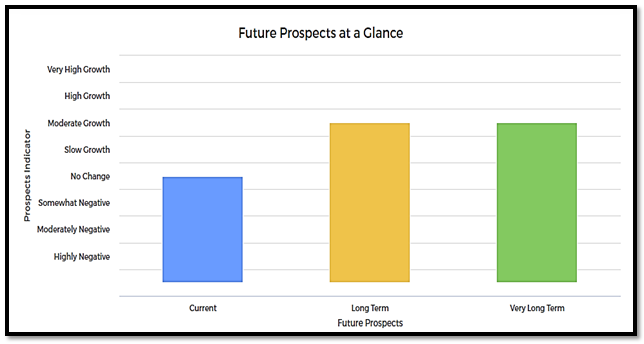
Future Prospects At A Glance
Current (0-1 year) | Long Term (2-5 year) | Very Long Term (6-10 years) |
No Change | Moderate Growth | Moderate Growth |

